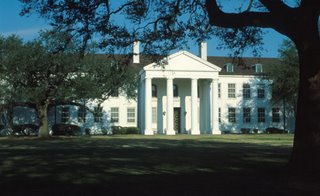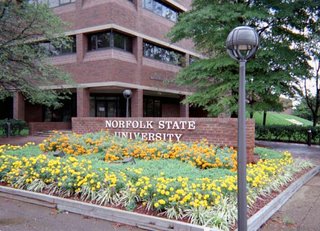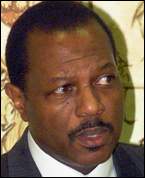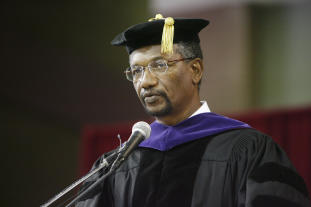Larry Huggins was in Indianapolis for the Circle City Classic weekend in 1994. While enjoying the annual matchup between two black college football teams, as well as the parties, shows and parade that typically attract 150,000 people, he thought, "We need this back in Chicago."
With that, he grabbed the ball and ran to assemble a team of six investors in the Chicago Football Classic -- which promptly lost money.
But it was about a mission, he said.
"If we did it for the financial gain, we would have stopped maybe four years ago," Huggins said.
The classic has been their contribution to black Chicago, showcasing historically black colleges and encouraging youth to consider enrolling. They've put on seven games in nine years, all at Soldier Field, skipping two years while the field was under renovation.
This year, Huggins, president of RiteWay Construction Services, and the remaining partners, Everett and Tim Rand, owners of Midway Airport Concessions and Midway Wholesalers Inc. hope to turn a profit.
Chicago's Saturday matchup between Mississippi Valley State University and the University of Arkansas at Pine Bluff is one of eight black college football classics taking place this weekend across the country.
The events, which black colleges have used to fill coffers, aren't all money losers. Those that are decades-old traditions continue to be a big draw, serving as mini Superbowls for their host cities:
The Atlanta Football Classic, an annual contest between Florida A&M University and Tennessee State University, and related activities draw about 150,000 people, who spend an estimated $35 million at hotels, restaurants, parties and vendor strips, according to sponsors. The game typically sells out the 70,000-seat Georgia Dome. (Some 80,000 fans come for the other events.)
Orlando's Florida Classic, where FAMU and Bethune Cookman College mix it up, sells about 70,000 tickets each year to the Citrus Bowl Stadium.
The Circle City Classic in Indianapolis and its related activities -- such as the $20-a-head Greek step shows, galas, nightclub admissions and corresponding get-better-acquainted breakfasts -- lure visitors who pump $20 million into the city, organizers figure.
Chicago Classic organizers want in on that league. They aren't the only ones.
Classic demographics
Twenty years ago, only a handful of classics existed. Today, about 40 annual games bear the name. Dozens of black college football classics sprang up in the 1990s as promoters saw how lucrative the games were in New Orleans, Indianapolis and other cities. Title sponsors, including State Farm, Verizon, McDonald's and Coca-Cola, have responded to the college-educated, middle-class crowds they draw. (The typical Indy classic goer is a 35-year-old, college-educated homeowner with a medium income of more than $60,000.)
Cities are trying to attract established classics, while some promoters are growing their own, said Thomas Dorsey, publisher and founder of SoulOfAmerica.com, an African-American travel planning Internet site.
"More cities are waking up to the opportunity. They're seeing the potential of filling up a whole bunch of hotel rooms," he said.
But it's not easy.
"It takes a while to build up to like your Florida Classic, but it's doable."
Even the classic classics are having a harder time these days. They face increased competition for participant teams, high gas prices and a fan base tapped out from direct Hurricane Katrina and Rita hits or contributions to related relief efforts.
Sometimes the newer ones can pose challenges for existing classics, said Tony Mason, executive director of the Circle City Classic. Failed deals can cause schools to be more stringent about contracts or other requirements.
Some organizers have promised too much to schools and haven't reached the ticket sales or gotten the sponsorships needed to cover obligations.
"There have been other producers offering sums of money that we find to be challenging, and we've been around for 20-plus years, and we average 50,000 a game," Mason said. "We wonder how they do it."
In some cases, they are late in paying the schools or they fail to pay all of the fees.
Still, the established ones have been moneymakers. And they're trying to get more fans to buy tickets to the games -- proceeds from which actually benefit black colleges -- and wrangling the independent promoters who produce popular events around the times of the games but siphon money from the causes.
Florida Classic schools last spring formed a consortium to get a better handle on events associated with the brand.
"There were so many bootleg events that popped up around the classic," said Matt Repchak, spokesman for Florida Citrus Sports, the not-for-profit Orlando entity that manages the Florida Classic. "We had a lot of people who were taking advantage of the classic name."
A winning formula in Indy
The Indianapolis classic's organizers work with promoters, encouraging them to fill holes in the schedule. Some make contributions to the scholarship program.
Increasingly, classics are picking up money by partnering with hotels that pay a commission from room fees charged during the weekends.
But a strong focus is on getting people into the stadium for the games, Mason said. The RCA Dome holds 57,000 to 58,000. The game itself draws an average of 50,000 people, but another 50,000 make their way to the plaza to buy from vendors, and about 75,000 to 100,000 show up for the annual classic parade -- an event so popular that organizers recently began charging $8 to $16 for one of 10,000 seats along the route.
The Chicago game's 40,000 in ticket sales last year makes it a straggler by classic standards.
"Anybody who's getting 40,000 to 45,000 is having a tough time," said John T. Grant Jr., CEO of the Atlanta Football Classic, taking place this year Sept. 30. "They can survive. Even if around 45,000, they're close to losing money."
The Atlanta Classic has generated more than $8 million for its two schools since 1996, said Jason C. Williams, spokesman for 100 Black Men of Atlanta, which for 18 years has produced the event. The event also has raised about $3 million for his group's charity,
"How many African Americans live in the Chicago area? That stadium should be sold out," Mason said. "All of these games exist as fund-raisers to support various organizations or scholarship programs to benefit not only the African-American community, but the community as a whole. If we don't support it, who will?"
Some schools play four to five classics a year and reap about about half of their athletic department budgets from the games.
The Chicago game is one of three football classics the UAPB will play in this year, including the Oct. 14 Delta Classic for Literacy in Little Rock, Ark., that will bring the school at least $125,000, and its regular appearance in the Gateway Classic in St. Louis in late September.
"It's a tremendous help. We get so many scholarships," said Jonail Landers, UAPB's athletic business manager. The games also increase visibility and aid in recruitment, she said.
The Southern advantage
Southern locations might have the benefit of being closest to the schools and their alumni. And weather there allows more options for game dates.
Sponsors have become increasingly important to the success of the games, Mason said.
The Chicago Classic is at a disadvantage in all of those areas. And it lacks some of the staples of other established classic weekends, such as a large scale parade, an R&B or hip-hop concert and a college fair.
But Huggins is hopeful. Word is getting around. There's more sponsorship, including Nike and ComEd.
"You never go into a business arrangement thinking you would lose money," Huggins said. "It's more a case of us being business people who truly love this city and are committed to making sure there is an event that African Americans can hang their hat on."
The Chicago event is growing, adding a full-time executive director and working with promoters to pull off a full-fledge step competition and after-party this year. And it's planning next year to include a concert, a side event that didn't take off in the first years.
The local event, which operates on a $1 million budget with each team getting $250,000 and a portion of ticket sales, also has been challenged by its traditional date: Labor Day Weekend. That's a weekend chock full of other options. In 2007, the classic will move to the second weekend in September.















